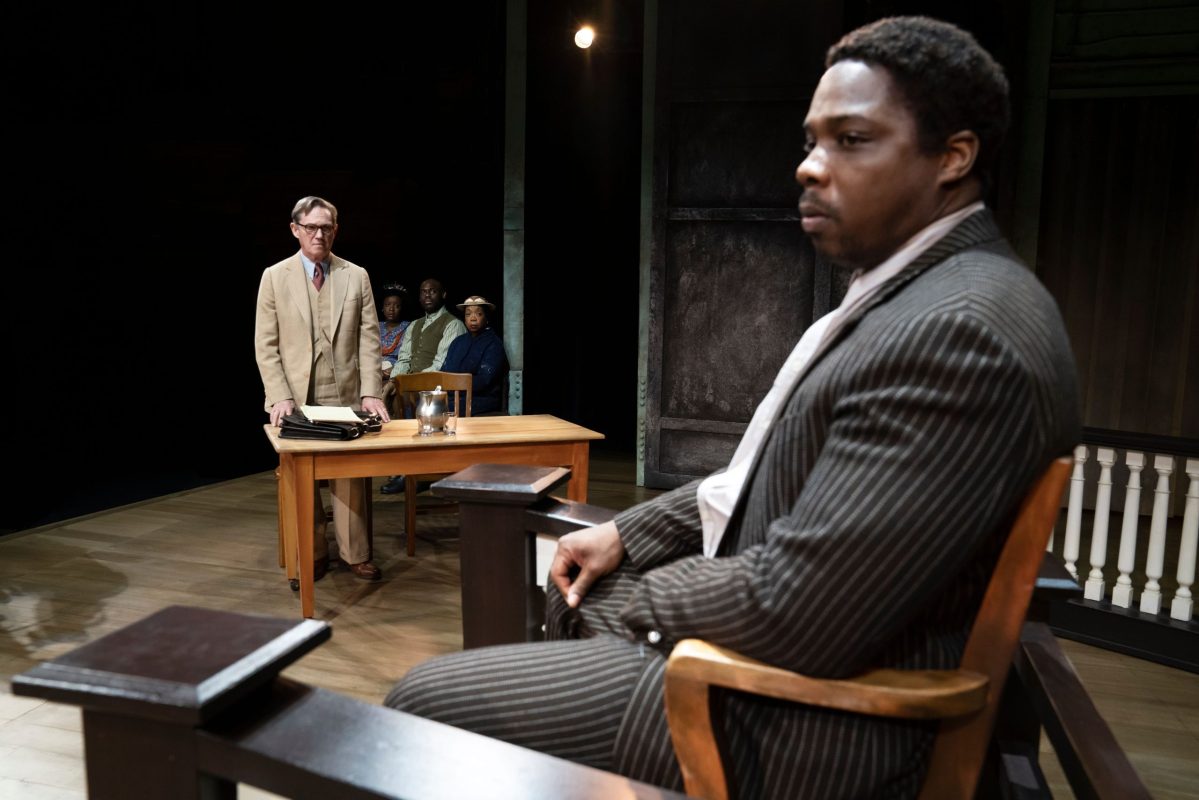“All rise.”
Those words bookend the fantastic production of Harper Lee’s To Kill a Mockingbird at the Hippodrome. Spoken by the bailiff during the trial of Tom Robinson, they signify respect for the judge and respect for the American legal system.
They also call to mind one of the most famous scenes in the 1960 book and the 1962 movie of To Kill a Mockingbird, a scene that Aaron Sorkin wisely removed when he updated the classic text for Broadway in 2018.
It’s the moment of greatest despair, after an all-White jury has delivered its death-sentence guilty verdict to Robinson, an innocent Black man. The Black people watching from the balcony, the only place they are allowed to gather, don’t protest or sob. Instead, they all rise in an ostentatious show of respect for Atticus Finch, the lawyer who took on the case and failed.
“Miss Jean Louise, stand up,” one spectator says to Atticus’s daughter, Scout. “Your father’s passin’.”
Ugh.
To Kill a Mockingbird has always been darker than Atticus Finch fanfic would have us believe.
In the tiny Alabama town of Maycomb in 1934, good and evil face off, and evil wins. Innocence – a belief that the law works, that people are basically decent, that father always knows best – is shattered. The mockingbird, which “don’t do one thing but make music for us to enjoy,” as Atticus says, is, in fact, killed.
The newer version does a masterful job of capturing some of that complexity, keeping audiences riveted through a running time of nearly three hours.
I don’t want to make it sound like it’s no fun, though. This play delivers plenty of well-earned laughs, and the real pleasures of watching smart, decent people trying to do smart, decent things, and getting smarter and more decent along the way.
Is Atticus flawed for believing that people are basically good, that you can only truly understand a person if you “consider things from his point of view, until you climb into his skin and walk around in it?” Yes. Yes, he is.
Is he a basically good person? Of course.
As Sorkin famously noted, it was no easy task to update a beloved classic in a way that stays true to the 1930s of the plot, the 1960s of the book and movie, and the Trump years of the current iteration.
Of course, the guy who gave us West Wing and The Social Network is up to the task, though too often the characters have that trite but satisfying Sorkin trait of always having the perfect snappy comeback, delivered with impeccable timing, as exactly the right moment.
Calpurnia, the Finch family domestic worker played by Jacqueline Williams, finally gets to speak up more than 60 years after Harper Lee invented her, delivering several of the show’s best lines. At one point, as Atticus waxes on about the importance of being respectful, she retorts: “No matter who you’re disrespecting by doing it.”
For the Broadway show, which debuted in December 2018 starring Jeff Daniels as Atticus, Sorkin rearranged the timeline of the plot, used adult actors for the children, and shifted the focus from Scout’s point of view to that of her father, Atticus.
The show, which runs at the Hippodrome through March 19, is part of its Broadway Across America series, meaning the same cast travels from city to city.
Richard Thomas, most famous as John Boy on The Waltons television show in the 1970s, plays Atticus with an endearing mix of self-deprecating charm and wry amusement at his children, Scout and Jem, and their new friend Dill.
Of particular note are Melanie Moore, who brings a childish blunt honesty to Scout; and Yaegel T. Welch, a member of Everyman Theatre’s resident company, who embodies all the fear, hope and heartbreak of Tom Robinson.

Bob Ewell is a tough role to play, but Joey Collins finds the dark humanity in a man who spouts the most vile racist tropes, abuses his daughter, and falsely blames a Black man, and all Black people, for his own weaknesses.
Arianna Gayle Stucki exudes the terror experienced by Mayella Ewell in scenes that make clear the terrible things that people will do to protect themselves.
And here’s a fun fact: Filling the small role of Mrs. Henry Dubose is Mary Badham, the actor who played Scout in the 1962 Gregory Peck movie. Her Playbill bio notes that she has devoted much of her life to promoting a message of social justice.
I wonder what she thinks now of Atticus’s sentiment that, “simply because we were licked a hundred years before we started is no reason for us not to try to win.”
If you go: To Kill a Mockingbird runs through March 19 at the Hippodrome Theatre, 12 N. Eutaw St., Baltimore, as part of the Broadway Across America series. Tickets can be purchased here.


